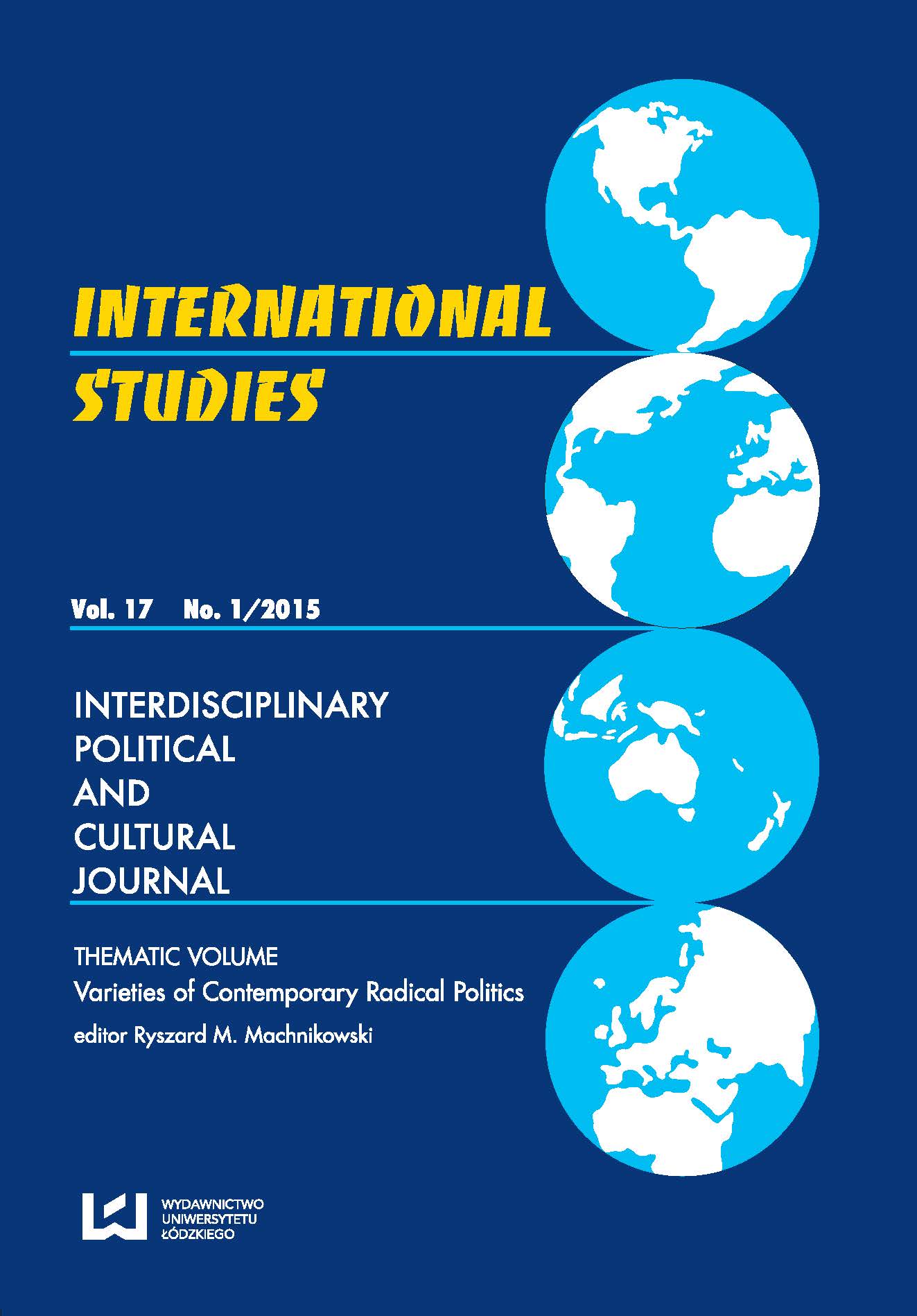Exploring the Theories of Radicalization
DOI:
https://doi.org/10.1515/ipcj-2015-0002Słowa kluczowe:
radicalization, theories, terrorism, ideology, grievance, threatAbstrakt
After the London bombings in July 2005, the concern of terrorism scholars and policy makers has turned to “home-grown” terrorism and potential for political violence from within the states. “Radicalization” became a new buzz word. This article follows a number of reviews of the literature on radicalization and offers another angle for looking at this research. First, it discusses the term “radicalization” and suggests the use of the following definition of radicalization as a process by which a person adopts belief systems which justify the use of violence to effect social change and comes to actively support as well as employ violent means for political purposes. Next, it proposes to see the theories of radicalization focusing on the individual and the two dimensions of his/her motivation: whether that motivation is internal or external and whether it is due to personal choice or either internal (due to some psychological traits) or external compulsion. Though not all theories fall neatly within these categories, they make it possible to make comparisons of contributions from a variety of different areas thus reflecting on the interdisciplinary nature of the study of terrorism in general and radicalization as a part of it.
Pobrania
Bibliografia
Bjørgo, Tore. Strategies for Preventing Terrorism. Houndmills: Palgrave MacMillan, 2013.
Zobacz w Google Scholar
Bongar, Bruce. “The Psychology of Terrorism: Defining the Need and Describing the Goals’, Psychology of Terrorism.” Bongar, Bruce, ed. Psychology of Terrorism. Oxford: Oxford University Press, 2007.
Zobacz w Google Scholar
Borum, Randy. Psychology of Terrorism. Tampa: University of South Florida, Web. 2004 https://www.ncjrs.gov/pdffiles1/nij/grants/208552.pdf?q=psychology-of-terrorism
Zobacz w Google Scholar
Bush, George W. “President Bush’s Speech in Monterrey, Mexico.” PBS Newshour, Web. 22 March 2002 http://www.pbs.org/newshour/updaAtes/white_house-jan-june02-bush_03-22/
Zobacz w Google Scholar
Carpenter, Joel. Revive Us Again: The Reawakening of American Fundamentalism. Oxford: Oxford University Press, 1997.
Zobacz w Google Scholar
Crenshaw, Martha. “The Logic of Terrorism: Terrorist Behavior as a Product of Strategic Choice.” Reich, Walter. Origins of Terrorism: Psychologies, Ideologies, Theologies, States of Mind. Washington D.C.: Woodrow Wilson Center Press, 1998.
Zobacz w Google Scholar
Dalgaard-Nielsen, Anja. Studying violent radicalization in Europe. Part I. Potential Contribution of Social Movement Theory. DIIS Working Paper. Copenhagen: Danish Institute for International Studies, 2008.
Zobacz w Google Scholar
Dalgaard-Nielsen, Anja. Studying violent radicalization in Europe. Part II. The potential contribution of socio-psychological and psychological approaches. DIIS Working paper. Copenhagen: Danish Institute for International Studies, 2008.
Zobacz w Google Scholar
Della Porta, D. Social movements, political violence and the state: a comparative analysis of Italy and Germany. Cambridge: Cambridge University Press, 1995.
Zobacz w Google Scholar
English, Richard. Terrorism. How to Respond. Oxford: Oxford University Press, 2009.
Zobacz w Google Scholar
European Commission Expert Group. Radicalization Processes Leading to Acts of Terrorism. Brussels: European Commission, 2008.
Zobacz w Google Scholar
Ferracuti, F. “Ideology and repentance: Terrorism in Italy.” Reich, W. Origins of Terrorism. Psychologies, Ideologies, Theologies, States of Mind. Washington: Woodrow Wilson Center Press, 1998.
Zobacz w Google Scholar
German, Mike. “Debunked NYPD Radicalization Report Just Won’t Die.” Web. 2013 https://www.aclu.org/blog/national-security-religion-belief/debunked-nypd-radicalization-report-just-wont-die
Zobacz w Google Scholar
Gurr, Ted. Why Men Rebel. Princeton: Princeton University Press, 2010 (1970).
Zobacz w Google Scholar
Homeland Security Institute. Radicalization: An Overview and Annotated Biography of Open-Source Literature. Final Report. Arlington: Homeland Security Institute, 2006.
Zobacz w Google Scholar
House of Commons Home Affairs Committee. Roots of Violent Radicalization. London: Stationery Office Limited, 2012.
Zobacz w Google Scholar
Huq, Aziz. “Modelling Terrorist Radicalization.” Duke Forum for Law and Social Change, 2010.
Zobacz w Google Scholar
McCauley, Clark and Sophia Moskalenko. Friction. How Radicalization Happens to Them and Us. Oxford: Oxford University Press, 2011.
Zobacz w Google Scholar
McCauley, Clark and Sophia Moskalenko. “Measuring Political Mobilization: The Distinction Between Activism and Radicalism.” Terrorism and Political Violence, 2009.
Zobacz w Google Scholar
Moghaddam, Fathali. “The Staircase to Terrorism: A Psychology Exploration.” Bongar, Bruce et al. Psychology of Terrorism. Oxford: Oxford University Press, (2007): 69-80.
Zobacz w Google Scholar
Muslim American Civil Liberties Coalition. “CountertERRORism policy. MACLC’s Critique of the NYPD’s Report on Homegrown Radicalism,”2008.
Zobacz w Google Scholar
Nasser-Eddine, Minerva et al. Countering Violent Extremism (CVE) Literature Review. Edinburgh South Austalia: Counter Terrorism and Security Technology centre, 2011.
Zobacz w Google Scholar
Neumann, Peter. “Introduction.” Neumann, Peter, ed. Perspectives on Radicalization and Political Violence. London: International Centre for the Study of Radicalization and Political Violence, 2008.
Zobacz w Google Scholar
NYPD. Radicalization in the West. The homegrown threat. New York: NYPD Intelligence Division, 2007.
Zobacz w Google Scholar
Pisiou, Daniela. Islamist Radicalisation in Europe. An Occupational change process. London: Routledge, 2012.
Zobacz w Google Scholar
Post, Jerrold. “Terrorist psycho-logic: Terrorist behavior as a product of psychological forces.” Reich, Walter. Origins of terrorism. Psychologies, ideologies, theologies, states of mind. Washington: Woodrow Wilson Center Press, 1998.
Zobacz w Google Scholar
Rae, Johnathan. “Will it ever be possible to profile terrorist?” Journal of Terrorism Research (2012).
Zobacz w Google Scholar
Richardson, Louise, ed. The Roots of Terrorism. Madrid: Club de Madrid series on Democracy and Terrorism, 2006.
Zobacz w Google Scholar
Roy, Olivier. Globalized Islam. The Search for a New Ummah. London: C Hurst & Co Publishers Ltd, 2001.
Zobacz w Google Scholar
Rubenstein, Richard. Alchemists of revolution. Terrorism in the modern world. New York: Basic Books, 1987.
Zobacz w Google Scholar
Sageman, Marc. Understanding Terror Networks. Philadelphia: University of Pennsylvania Press, 2004.
Zobacz w Google Scholar
Schmid, Alex. Radicalisation, De-Radicalisation, Counter-Radicalisation: A Conceptual Discussion and Literature Review. ICCT Research Paper. The Hague: International Centre for Counter-Terrorism, 2013.
Zobacz w Google Scholar
Sedgwick, Mark. “The Concept of Radicalization as a Source of Confusion.” Terrorism and Political Violence (2010): 479-494.
Zobacz w Google Scholar
Silke, A. Research on Terrorism. Trends, Achievements and Failures. London: Frank Cass, 2004.
Zobacz w Google Scholar
Silke, A. “The Devil You Know: Continuing Problems with Research on Terrorism.” Terrorism and political violence, 2001.
Zobacz w Google Scholar
Silke, A. “The impact of 9/11 on research on terrorism.” Ranstorp, M. Mapping Terrorism Research. State of the art, gaps and future direction. London: Routledge, 2007.
Zobacz w Google Scholar
Stampnitzky, Lisa. Disciplining terror: How experts invented “Terrorism.” Cambridge: Cambridge University Press, 2014.
Zobacz w Google Scholar
Zartman, W. “Need, Creed and Greed in Intrastate Conflict.” Arnson, C. and W. Zartman. Rethinking the Economics of War. The Intersection of Need, Creed, and Greed. Washington: Woodrow Wilson Center Press, 2005.
Zobacz w Google Scholar
Tilly, Charles and Sydney Tarrow. Contentious politics. OUP USA, 2012.
Zobacz w Google Scholar
Trujillo, Humberto, Juan Ramirez and Ferran Alonso. “Indicios de persuasión coercitiva en el adoctrinamiento de terroristas yihadistas: hacia la radicalización violenta.” Universitas Psychologica (2009).
Zobacz w Google Scholar
Wintrobe, Ronald. “Can suicide bombers be rational?” 2001. http://www.diw.de/deutsch/service/veranstaltungen/ws_consequences/docs/diw_ws_consequences200206_wintroepdf 6 September 2007.
Zobacz w Google Scholar
Volkan, Vamik. “September 11 and Societal Regression.” Group Analysis (2002).
Zobacz w Google Scholar
Pobrania
Opublikowane
Jak cytować
Numer
Dział
Licencja

Utwór dostępny jest na licencji Creative Commons Uznanie autorstwa – Użycie niekomercyjne – Bez utworów zależnych 4.0 Międzynarodowe.

















